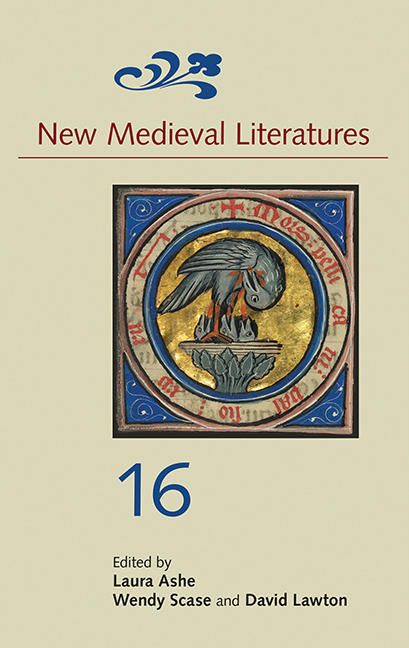Book contents
- Frontmatter
- Contents
- 1 The Book of the World at an Anglo- Norman Court: The Bestiaire de Philippe de Thaon as a Theological Performance
- 2 Monks, Money, and the End of Old English
- 3 Sustainability Romance: Havelok the Dane's Political Ecology
- 4 Locating the Border: Britain and the Welsh Marches in Fouke le Fitz Waryn
- 5 From disputatio to predicatio – and back again: Dialectic, Authority and Epistemology between the Roman de la Rose and the Pèlerinage de Vie Humaine
- 6 Mixed Feelings in the Middle English Charlemagne Romances: Emotional Reconfiguration and the Failures of Crusading Practices in the Otuel Texts
- 7 Circularity and Linearity: The Idea of the Lyric and the Idea of the Book in the Cent Ballades of Jean le Seneschal
- 8 ‘What shal I calle thee? What is thy name?’: Thomas Hoccleve and the Making of ‘Chaucer’
3 - Sustainability Romance: Havelok the Dane's Political Ecology
Published online by Cambridge University Press: 05 July 2016
- Frontmatter
- Contents
- 1 The Book of the World at an Anglo- Norman Court: The Bestiaire de Philippe de Thaon as a Theological Performance
- 2 Monks, Money, and the End of Old English
- 3 Sustainability Romance: Havelok the Dane's Political Ecology
- 4 Locating the Border: Britain and the Welsh Marches in Fouke le Fitz Waryn
- 5 From disputatio to predicatio – and back again: Dialectic, Authority and Epistemology between the Roman de la Rose and the Pèlerinage de Vie Humaine
- 6 Mixed Feelings in the Middle English Charlemagne Romances: Emotional Reconfiguration and the Failures of Crusading Practices in the Otuel Texts
- 7 Circularity and Linearity: The Idea of the Lyric and the Idea of the Book in the Cent Ballades of Jean le Seneschal
- 8 ‘What shal I calle thee? What is thy name?’: Thomas Hoccleve and the Making of ‘Chaucer’
Summary
The second half of the thirteenth century saw the climatic transition from the Medieval Warm Period to the Little Ice Age as well as the beginning of romance writing in English. Mean annual temperatures began falling around 1200, and solar activity declined from the 1250s until about 1380. In the 1250s, much of northern Europe saw wet, cold summers and subsequent crop failures. Between 1280 and 1300, a poet from Lincolnshire, where there were major famines in 1258 and 1294, composed a Middle English romance that updated a local legend of a Danish king of England. Unlike its Anglo- Norman antecedents, Geffrei Gaimar's Histoire des Engleis (c.1135–40) and the Lai d'Haveloc (c.1190– 1220), Havelok the Dane (c.1280–1300) is full of hunger and labour, famine, and quotidian details of material life. This Middle English romance is energized by environmental anxieties about where food will come from, about how resources can be sustained, and about how governance can protect against environmental crises.
These are the same worries that animated and continue to animate many twentieth- and twenty- first- century conversations and policy decisions about climate change. While the ecological effects of global warming differ from those of global cooling, the environmental and political questions and strategies put forth in sustainability documents such as the 1987 UN- commissioned Report of the World Commission on Environment and Development: Our Common Future are also reflected in Havelok the Dane's narrative engagement with political ecology: how to reckon with the interconnectedness of environmental health, politics, and labour; how to generate self- reliant surpluses; how to navigate sustainable relationships between urban and rural populations; how to govern oceans and other ‘global commons’; and how political power can disrupt or sustain environmental health and vice versa. Much more recently, Pope Francis released an encyclical ‘on care for our common home’; aligning himself with today's mainstream science, he focused on climate change as an issue requiring immediate attention.
Havelok engages with these same issues in a theoretical rather than a practical way: the romance narratively enacts a fantastic, sustainable political ecology. At the beginning of Havelok, Denmark and England are both usurped by wicked advisors; the heir to Denmark, Havelok, is raised in Lincolnshire by the fisherman Grim, and Havelok is eventually wed to England's princess, Goldeboru. The two heirs conquer and regain their territories and rule them as a united kingdom.
- Type
- Chapter
- Information
- New Medieval Literatures , pp. 83 - 108Publisher: Boydell & BrewerPrint publication year: 2016



